词汇与语法②
词汇与语法(二)
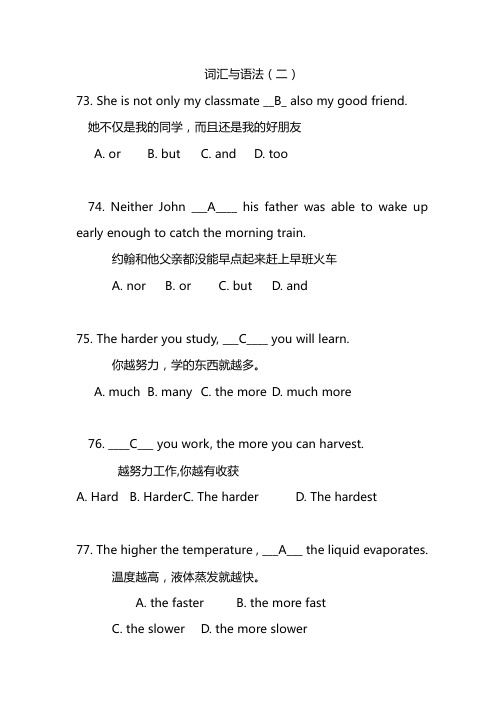
词汇与语法(二)73. She is not only my classmate __B_ also my good friend.她不仅是我的同学,而且还是我的好朋友A. orB. butC. andD. too74. Neither John ___A____ his father was able to wake up early enough to catch the morning train.约翰和他父亲都没能早点起来赶上早班火车A. norB. orC. butD. and75. The harder you study, ___C____ you will learn.你越努力,学的东西就越多。
A. muchB. manyC. the moreD. much more76. ____C___ you work, the more you can harvest.越努力工作,你越有收获A. HardB. HarderC. The harderD. The hardest77. The higher the temperature , ___A___ the liquid evaporates.温度越高,液体蒸发就越快。
A. the fasterB. the more fastC. the slowerD. the more slower78. Nancy is considered to be ___D____ the other students in her class.大家认为南希和他们班其他同学一样聪明。
A. less intelligentB. the most intelligentC. intelligent as wellD. as intelligent as79. They got there an hour __D_____ than the others.他比别人早到一小时。
专升本《英语》词汇与语法结构
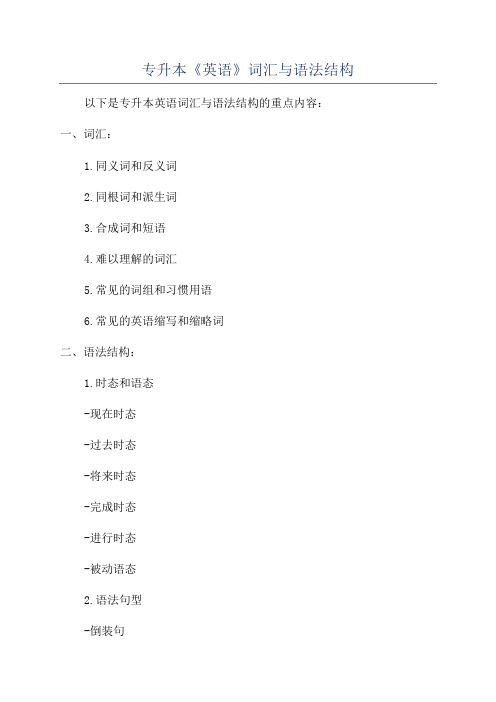
专升本《英语》词汇与语法结构以下是专升本英语词汇与语法结构的重点内容:
一、词汇:
1.同义词和反义词
2.同根词和派生词
3.合成词和短语
4.难以理解的词汇
5.常见的词组和习惯用语
6.常见的英语缩写和缩略词
二、语法结构:
1.时态和语态
-现在时态
-过去时态
-将来时态
-完成时态
-进行时态
-被动语态
2.语法句型
-倒装句
-条件句
-间接引语和直接引语
-强调句
3.从句和复合句
-名词性从句(主语从句、宾语从句、表语从句、同位语从句)-定语从句
-状语从句
-表语从句
4.代词和词性
-人称代词和物主代词
-反身代词和相互代词
-指示代词和疑问代词
-不定代词和关系代词
5.形容词和副词
-基本形容词和副词的比较级和最高级
-修饰方式、程度、时间和频率的副词
-形容词和副词的转化
6.名词和数词
-可数名词和不可数名词
-单数名词和复数名词
-名词的所有格
-基数词和序数词
以上是专升本英语词汇与语法结构的主要内容,希望对你的学习有帮助。
词汇与语法

宾语:句子中表示动作、行 为的对象或结果的部分
补语:句子中补充说明宾语 或主语的部分,通常表示动
作的方式、时间、地点等
状语:修饰动词、形容词或整个句子的成分,表示时间、地点、方式等 定语:修饰名词或代词,表示品质、特征、所属等 状语和定语在句子中起到描述和限定的作用 正确使用状语和定语可以提高语言表达的准确性和丰富性
主语、谓语、宾语是句子的主要成分 定语、状语、补语是句子的次要成分 句子成分的顺序是主语、谓语、宾语,然后是定语、状语、补语 句子成分的顺序是遵循一定的规则和习惯的
并列复合句:由两个或两个以上的简单句并列组成,表达相对独立的含义。 主从复合句:由一个主句和一个或多个从句组成,从句在句中充当主句的一个成分。 嵌套复合句:一个复合句中包含另一个复合句,形成嵌套结构。 包孕复合句:一个复合句包含另一个简单句,形成包孕结构。
练习建议:多阅读,多写作, 提高语言运用能力
缺少主语或 谓语
句子成分多 余或残缺
语序不当 句式杂糅
词汇选择:根据语境选择合适 的词汇,表达准确含义
语法结构:运用正确的语法结 构,使句子通顺流畅
词汇丰富度:使用多样化的词 汇,增加语言表达的丰富性
语法准确性:确保语法正确, 避免产生歧义或误解
理解句子含义:通过词汇和语法 的组合,理解句子的具体含义。
添加标题 添加标题 添加标题 添加标题
定义:主语和谓语在人称、数、格等方面不一致的语法错误。
常见类型:主语是复数形式,谓语却是单数形式;主语是单数形式,谓 语却是复数形式。
纠正方法:检查主谓是否一致,确保在语法和语义上都符合规范。
示例:正确的句子:“The books are on the shelf.”(书在架子上。) 错误的句子:“The book is on the shelf.”(书在架子上。)
词汇和语法的关系
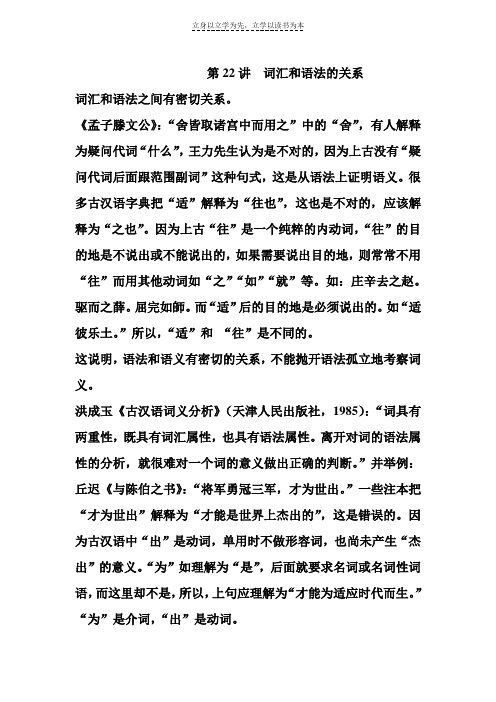
第22讲词汇和语法的关系词汇和语法之间有密切关系。
《孟子滕文公》:“舍皆取诸宫中而用之”中的“舍”,有人解释为疑问代词“什么”,王力先生认为是不对的,因为上古没有“疑问代词后面跟范围副词”这种句式,这是从语法上证明语义。
很多古汉语字典把“适”解释为“往也”,这也是不对的,应该解释为“之也”。
因为上古“往”是一个纯粹的内动词,“往”的目的地是不说出或不能说出的,如果需要说出目的地,则常常不用“往”而用其他动词如“之”“如”“就”等。
如:庄辛去之赵。
驱而之薛。
屈完如師。
而“适”后的目的地是必须说出的。
如“适彼乐土。
”所以,“适”和“往”是不同的。
这说明,语法和语义有密切的关系,不能抛开语法孤立地考察词义。
洪成玉《古汉语词义分析》(天津人民出版社,1985):“词具有两重性,既具有词汇属性,也具有语法属性。
离开对词的语法属性的分析,就很难对一个词的意义做出正确的判断。
”并举例:丘迟《与陈伯之书》:“将军勇冠三军,才为世出。
”一些注本把“才为世出”解释为“才能是世界上杰出的”,这是错误的。
因为古汉语中“出”是动词,单用时不做形容词,也尚未产生“杰出”的意义。
“为”如理解为“是”,后面就要求名词或名词性词语,而这里却不是,所以,上句应理解为“才能为适应时代而生。
”“为”是介词,“出”是动词。
这些例子说明了词汇和语法的关系:第一,一个词有某种词义,就必然会有相应的语法属性。
因此,也就决定了它能进入某一种语法结构,和不能进入另一种语法结构。
第二,有时一个词的某种语法属性会使它区别于一些近义词,如“往”是内动词,“适”是外动词。
以上说明同一时代平面上词汇和语法的密切关系。
从语言的历史发展看,词汇和语法也是相互影响的。
一、由语法关系而造成的词义变化在语言的历史发展过程中,语法对词义变化的影响最明显地表现在下面一种事实上:有的词义的发展变化,是它长期处于某种语法位置造成的。
“是”字的变化即属此类。
这样的例子还有:1、为古汉语“为”的基本用法是动词。
基础英语词汇与语法练习100题(二)(精编)

基础英语词汇与语法练习100题(二)(精编)1. Jinan is capital of Shandong Province.A. TheB. aC. anD. /2. Look!Jinan is now than it used to be.A. quite beautifulB. the most beautifulC. very beautifulD. much more beautiful3. If you want people to treat you nicely, then you have to treat nicely,too.A. theirB. theyC. themD. themselves4. In the West, people like to finish a meal with ,for instance,dessert.A. sweet anythingB. sweet somethingC. anything sweetD. something sweet5. In order to protect the environment, people in Japan have to for their trash.A. costB. payC. spendD. take6. Qian Xuesen is known as China's “father of space technology” and "king of roc kets". He diedOctober 31 at the age of 98. A. in B. on C. at D. of7.Some students spend time on the Internet. They forget to study, eat and sleep. They can't even communicate with people in real life.A. too manyB. many tooC. too muchD. much too8. If you really hold on to your dreams, they true one day.A. cameB. comesC. has comeD. will come9. There a tiger and two chimpanzees in the zoo. Let's go there this weekend.A. areB. hasC. isD. have10. A great meeting about weather change in Copenhagen (哥本哈根)in December, 2009. A. took place B. took pride C. took care D. took after11.In fact, China is one of the 13 thirstiest countries it has the world's third largest water supply . A.until B. if C. though D. because12. I must return the dictionary to Allen now. I it for three weeks already.A. keptB. will keepC.keepD. have kept13. Teenagers love teachers are energetic and friendly.A. whomB. who C which D. /14. —Your father is sleeping. Would you mind turning down the TV? —. I'll do it right away.A. Not at allB. Of courseC. No wayD. Sounds good15. —Excuse me. Could you tell me from here to the bookstore? —Sure. About two Miles. A. how much is it B. how much it is C. how far is it D. how far it is 16. Avatar(阿凡达)is such wonderful science fiction movie that I want to see it second time. A. a, a B. a,the C ./, the D./,a17. Michael Jordan has failed over and over again in his life. And that's he succeeds.A. whatB. whenC. whyD. where18. I'm expecting a pet dog for long, but mom has no time to buy for me.A. itB. oneC. thisD. that19. At least 300 million people are using QQ by Ma Huateng to chat on line.A. CreateB. createsC. creatingD. created20. The cookies good. Could I have some more?A. tasteB. smellC. feelD. sound21. —Tom,I'm watching a football match. What about you?A. So do I.B. So am I.C. So I do.D. So I am.22. —Sorry, sir. I made a mistake again. —Practice more and you will do better.A. Never mind.B. I'm not sure.C. You're welcome.D. Don't mention it.23. —Is Jessica giving us a speech this evening? —No, it be her. She to Japan.A. mustn't;has goneB. mustn't;has beenC. can't;has goneD. can't;has been24. A moment, please. I'm checking if Mr. Smith free tomorrow.A. isB. beingC. to beD. will be25. China is developing ____ of all the countries in the world.A. fastB. fasterC. fastestD. the most fast26. Alice in Wonderland is a fantastic movie. It's about .A. how did Alice end the Red Queen's reign of terror(恐怖统治)B. what did Alice end the Red Queen's reign of terrorC. how Alice ended the Red Queen's reign of terrorD. what Alice ended the Red Queen's reign of terror27.—Wouldyou like tea or coffee? —is OK. I really don't mind.A. NoneB. EitherC. NeitherD. Both28. The little elephant is afraid to go alone. He always walks his mother.A. besidesB. besideC. belowD. under29. You have to leave now ____ you can catch the early bus.A. so thatB. as soon asC. becauseD. if30. —do you have PE lessons? —Three times a week.A. How longB. How soonC. How manyD. How often31. —Life pets always full of fun. —That's right.A. with; areB. with;isC. and; haveD. and; has32. —do you think is the best restaurant? —The one on Bridge Street.A. WhoB. WhereC. WhatD. How33. —Did you listen to the weather report on the radio this morning?A. Yes,it's going to be cloudy for the next few daysB. Yes, I'm glad to hear thatC. No’ it won'tD. No, it wasn't sunny34. Avatar (《阿凡达》)is an interesting film. My brother it twice already.A. seesB. sawC. has seenD. will see35. —Excuse me,please look at the sign .”Sorry, I didn't see it. I'm putting out the cigarette.36. I he young man is a friend of mine.A. who I had a talkB. whom I had a talk withC. whom I had a talkD. which I had a talk with37. There is no difference between the two sweaters, so I really don't know .A. which choose oneB. which to choose oneC. to choose which oneD. which one to choose38. Is easy to who picks the fruit and vegetables on your net farm?A. that; findB. it;findingC. that;find outD. it;find out39. This kind of T-shirt looks and sells .A. nice;wellB. nice;goodC. well;wellD. good;nice40. —Who it be walking in the garden?—It be Mr. Li. He has gone to the supermarket.A. may;mustn'tB. might;may notC. can;can'tD. could;mustn't41. —I think college students should be allowed to have part-time jobs.— . That will be a good experience and lesson for them.A. I suppose soB. I disagree with youC. No problemD. I think not42. —How about going hiking this weekend? —Sorry. I prefer rather than_ .A. to go out;stay at homeB. to stay at home;go outC. staying at home;to go outD. going out;stay at home43 . ,they were very happy.A. Though they have no moneyB. Though they had got fine clothesC. Although they were very poorD. Although they were rich44.—Why are you standing in front of the mirror with your eyes ?—Oh. I want to see when I'm asleep.A. closed;what do I look likeB. closing;how I look likeC. closed;what I look likeD. closing;what I am like45. —new buildings !I can't believe that. It a poor village.—Yes. Everything has changed here these years.A. So many; used to beB. So much;is used to beingC. Too many;used to beD. Too much;used to46. —Did you have nice holiday? —Yes, it was best holiday I've ever had.A. the;theB. the;aC. a;aD. a;the47. —When shall I phone you, morning or afternoon? —. I'll be at home all day.A. AllB. BothC. EitherD. Neither48. The road is usually very busy, especially ___ the rush hours.A. duringB. onC. whileD. among49.— Do you still remember with Yao Ming in Beijing? —Yes,of course,three years ago.A. to meetB. meetingC. meetD. met50. It's a nice house it hasn't got a garden.A. becauseB. orC. butD. so51 . of his time been spent on studies every day.A. Three fourths ;hasB. Three fourths ;haveC. Third fours;hasD. Thirds four;have52. That restaurant be very good. It's always full of people.A. can'tB. mayC. shouldn'tD. must53. Peter didn't tell the truth but his father .A. found out himB. find himC. found him outD. looked him for54. If the postman has a registered(挂号)letter for us, he it to our flat.A. bringsB. sendC. leavesD. take55. John is 180 centimeters tall, and his daughter is 90. So he is twice she.A. so tall asB. as tall asC. much taller thanD. less than56. Was your school trip to the mountains ?A. succeedB. succeededC. successfulD. successfully57. Look! There the new bridge. It last month.A. is;buildB. was;builtC. is;was builtD. is;is built58. Where is the key fits this lock?A. whichB. whoC. howD. what59. She hurt herself badly she had to see a doctor.A. too;thatB. so;thatC. very;thatD. too; to60. David doesn't know for Guangzhou,because the boss hasn't decided who to go.A. when he will leaveB. when will he leaveC. if he leavesD. if he'll leave61. As volunteer teacher in the rural area,she has opened up students' eyes to the outside world. A. the;the B. a;a C. a;the D. the;a62. At the foot of Wulian Mountains, you can hear the of running water.A. soundB. noiseC. voiceD. silence63. Li Lei, my best friend,is a little outgoing than any other student in his class.A. muchB. manyC. moreD. very64. —Where is Mr. Wang? —He a meeting in Room 405 now.A. is havingB. hasC. has hadD. will have65. All has proved that World Expo 2010 Shanghai China is quite .A. activeB. helpfulC. proudD. successful66. —Must I hand in my writing after school?—No,you . You can give it to me tomorrow.A. mustn'tB. can'tC. needn'tD. shouldn't67. Wait a moment, please. I'll show you it.A. how to doB. what to doC. when to doD. which to do68. My brother once studied in America for three years, so he can English very well.A. talkB. speakC. sayD. tell69. I was listening to music my English teacher came in.A. untilB. whileC. sinceD. when70. The foreigner spoke so fast that I could follow him.A. nearlyB. almostC. hardlyD. easily71. The sports meeting has been because of the bad weather.A. put upB. put offC. put outD. put on72. —Would you like tea or coffee? —. I'd like some coke.A. NeitherB. EitherC. BothD. Each73 . my surprise,the twins have nothing common.A. In;inB. To;inC. With;onD. For;of74.1 don't know if it tomorrow. If it ,we won't go hiking.A. rains;rainsB. will rain;rainsC. rains;will rainD. will rain;will rain75. —Could you tell me ____ ?—Sorry, I don't know.A. how can I get to the Water Sports CenterB. when will Mr. Black come backC. why is Tom late for classD. where Mr. Green has gone76. —When will the train D51 arrive? — a few minutes.A. Since B For C. In D. After77.—Jeff, my dictionary isn't here. Can I use ?—Certainly. Here you are.A. you B your C. mine D. yours78. Where is Maria Brown? Please call me when she .A. comeB. comesC. comingD. came79. —Why are you in such a hurry? —Bill is ill. I'm going to a doctor for him.A. getB. askC. sendD. take80. —Must I stay here till you come back? —No, you .A. mustn'tB. can'tC. needn'tD. shouldn't81. —You're so early! —I think impolite to be late.A. thisB. thatC. oneD. it82. —Your room looks very tidy. —Yes. It every day.A. cleansB. cleaningC. cleanedD. is cleaned83. —How far is it from here to the hospital? —It's about ride.A. twenty minuteB. twenty minuses C twenty minutes' D. twenty-minutes84.—Look !The old man is running around the lake.—He likes running. It has been a of his for many years.A. habitB. planC. ruleD. aim85. —Why don't you want to see the dolphin show? —I it before.A. see E saw C. will see D. have seen86. Mr Black gave a lot of money to charities he was not rich.A. butB. soC. thoughD. as if87. Not only his parents but also he watching sports programs.A. likeB. likesC. don't like1D. not like88. —She plays the guitar wonderfully. —Yes. And her voice sounds , too.A. beautifulB. more beautifulC. beautifullyD. more beautifully89. —Would you like to have some fruit?—No, thanks. I don't feel like anything now.A. eatB. eatingC. to eatD. ate90. —I'm sorry I don't understand . —Don't worry. I'll repeat it.A. what you saidB. which you said C what did you say D. which did you say91. —How long does it take you to do your homework every day? —About hour.A. aB. anC. theD. /92. —What kind of fruit is your favourite? .A. RiceB. MilkC. ApplesD. Mutton93. —Are you worried your son, Mrs Green? —Yes. He is weak in Chinese.A. forB. toC. withD. about94. —are you going for your summer vacation?—I'm going to South Africa to watch the World Cup.A. WhereB. WhenC. HowD. Why95. —Mike,be sure to come back before 10 o'clock. —OK, Dad. I .A. canB. willC. mustD. should96. When you receive presents from others,don't forget to "Thank you".A. sayB. speakC. talkD. tell97. My father is a teacher. He often late till 12 o'clock to get ready for his lessons.A. stays upB. gets upC. wakes upD. shows up98. I met many new words I was reading the English novel.A. ifB. thoughC. whileD. before99. —Anne, do you know Susan? —Sure. We friends for nearly two years.A. have knownB. have beenC. have becomeD. have made 100.—Excuse me. Could you please tell me ?—Sorry. I'm new here.A. how you usually go to schoolB. where can I exchange moneyC. who you bought the toys forD. if there's a bank on this road1-5. ADCDB 6-10 BCDCA 11-15 CDBAD 16-20 ACBDA21-25 BACDC 26-30 CBBAD 31-35 BCACA 36-40. BDDAC41-45ABCCA 46-50 DCABC 51-55 ADCAB 56-60CCABD61-65 CACAD 66-70 CABDC 71-75 BABBD 76-80 CDBCC81-85. DDCAB 86-90 CBABA 91-95.BCDAB 96-100 AACBD。
4年级词汇与语法 (2)
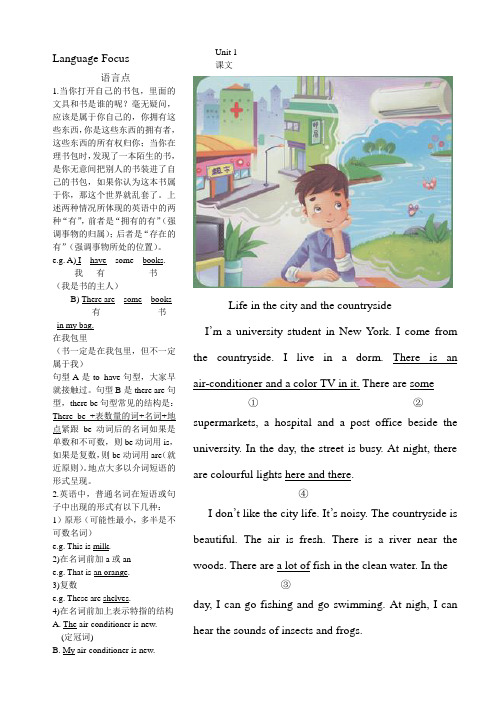
Language Focus语言点1.当你打开自己的书包,里面的文具和书是谁的呢?毫无疑问,应该是属于你自己的,你拥有这些东西,你是这些东西的拥有者,这些东西的所有权归你;当你在理书包时,发现了一本陌生的书,是你无意间把别人的书装进了自己的书包,如果你认为这本书属于你,那这个世界就乱套了。
上述两种情况所体现的英语中的两种“有”,前者是“拥有的有”(强调事物的归属);后者是“存在的有”(强调事物所处的位置)。
e.g. A) I have some books.我有书(我是书的主人)B) There are some books有书in my bag.在我包里(书一定是在我包里,但不一定属于我)句型A是to have句型,大家早就接触过。
句型B是there are句型,there be句型常见的结构是:There be +表数量的词+名词+地点紧跟be动词后的名词如果是单数和不可数,则be动词用is,如果是复数,则be动词用are(就近原则)。
地点大多以介词短语的形式呈现。
2.英语中,普通名词在短语或句子中出现的形式有以下几种:1)原形(可能性最小,多半是不可数名词)e.g. This is milk.2)在名词前加a或ane.g. That is an orange.3)复数e.g. These are shelves.4)在名词前加上表示特指的结构A. The air-conditioner is new.(定冠词)B. My air-conditioner is new.Unit 1课文Life in the city and the countrysideI’m a university student in New York. I come from the countryside. I live in a dorm. There is an air-conditioner and a color TV in it. There are some①②supermarkets, a hospital and a post office beside the university. In the day, the street is busy. At night, there are colourful lights here and there.④I don’t like the city life. It’s noisy. The countryside is beautiful. The air is fresh. There is a river near the woods. There are a lot of fish in the clean water. In the③day, I can go fishing and go swimming. At nigh, I can hear the sounds of insects and frogs.(物主代词)C. This air-conditioner is new. (指示代词)D. Peter’s air-conditioner is new. (人名’s)被特指的名词一般不能紧跟在there be句型的be动词后。
第二讲 语法和语音、词汇的关系

语音对句法的影响
一、语音对词类性质的影响 主要表现在音节节律对词类性质的影响。 在动词词类上比较明显。 “研究、分析、工作、计划、影响、保证” 研究、分析、工作、计划、影响、保证” 在词类的问题上,学者们地看法不一。但 单音节不会出现此类的问题。 现代汉语的单音节动词与双音节动词(具有 不同程度的名词性) 读——阅读 ——阅读 等——等待 来——到来 ——等待 ——到来 盼——盼望 ——盼望 赔——赔偿 停——停顿 ——赔偿 ——停顿
在“动补+宾”的结构中,补语的音节数直 动补+ 接决定结构的合法性。 他累弯了腰。 他累弯曲了腰。 小红哭哑了嗓子。 小红哭嘶哑了臊子。 张三打碎了杯子。 张三打粉碎了杯子。 这些单纯从语法和语义上是无法解释的。
三、语音对句法结构、语义理解的影响 A 语音停顿 年轻的妻子死了丈夫发誓不再结婚。 咬死了猎人的狗。 B语音的轻重 我想起来了。 小王一个上午就完成了一项工作。
如:我去去就回来。 我出去出去就回来。 老师敲敲讲桌,要大家仔细听。 老师敲敲讲桌,要大家仔细听。 老师敲击敲击讲桌,要大家仔细听。 老师敲击敲击讲桌,要大家仔细听。 单音节动词重叠的比例大。 C、形容词 单音节和双音节在重叠形式上不 同。单音节的形容词大多可以重叠,但双 音节的形容词大概只有10%可以重叠。音 音节的形容词大概只有10%可以重叠。音 节节律严重制约着形容词的构形形态。 D、量词 无论是动量词还是名量词,无论是 固定量词还是临时量词,只有单音节能重 叠。
根据现代语义学理论,词的词汇意义是可 以分解的,它是若干个义素的集合,有些 义素决定该词与其它词类的搭配关系。 目前的研究,人们对语义特征的提取主要 集中在名词 动词和形容词上。 集中在名词、动词和形容词上。 名词、 学者们提取名词 学者们提取名词语义特征主要有:[+-人类] 名词语义特征主要有:[+-人类] [+-动物] [+-具体] [+-生命] 等。 [+-动物] [+-具体] [+-生命] 具有[ 人类] 具有[-人类]语义特征的名词不能充当动 作“说、笑、走、”等的主语;而[+人类] 说、笑、走、”等的主语;而[+人类] 特征的名词都可以。
语言学中的语法与词汇
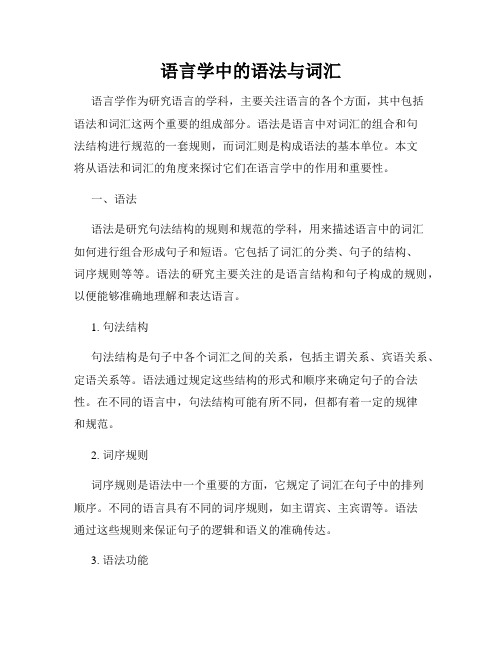
语言学中的语法与词汇语言学作为研究语言的学科,主要关注语言的各个方面,其中包括语法和词汇这两个重要的组成部分。
语法是语言中对词汇的组合和句法结构进行规范的一套规则,而词汇则是构成语法的基本单位。
本文将从语法和词汇的角度来探讨它们在语言学中的作用和重要性。
一、语法语法是研究句法结构的规则和规范的学科,用来描述语言中的词汇如何进行组合形成句子和短语。
它包括了词汇的分类、句子的结构、词序规则等等。
语法的研究主要关注的是语言结构和句子构成的规则,以便能够准确地理解和表达语言。
1. 句法结构句法结构是句子中各个词汇之间的关系,包括主谓关系、宾语关系、定语关系等。
语法通过规定这些结构的形式和顺序来确定句子的合法性。
在不同的语言中,句法结构可能有所不同,但都有着一定的规律和规范。
2. 词序规则词序规则是语法中一个重要的方面,它规定了词汇在句子中的排列顺序。
不同的语言具有不同的词序规则,如主谓宾、主宾谓等。
语法通过这些规则来保证句子的逻辑和语义的准确传达。
3. 语法功能语法的主要功能是使人们能够理解和表达语言。
它规定了语言的结构和句子的组成规则,使得人们能够根据这些规则来理解和解读语言。
同时,语法也为人们提供了一种准确和系统化的方式来表达自己的思想和观点。
二、词汇词汇是构成语言的基本单位,它由各种不同的词汇类别组成,如名词、动词、形容词等。
词汇是语法的基础,也是语言表达的重要组成部分。
1. 词汇类别不同的语言包含着不同的词汇类别,这些类别常常以词性来划分,如中文中的名词、动词和形容词等。
词汇类别不仅反映了语言中的事物、动作和属性等概念,也为语法提供了基本的构建材料。
2. 词汇的功能词汇除了代表具体的事物和概念外,还具有一定的语法功能。
词汇的选用和使用能够改变句子的句法结构和意义,使得表达更加精确和准确。
同时,不同的词汇之间也存在着一定的关联性和搭配规则,这些规则对于语言的正常理解和使用非常重要。
3. 词汇的学习和应用词汇的学习和应用是学习一门新语言的基础。
英语的词汇与语法
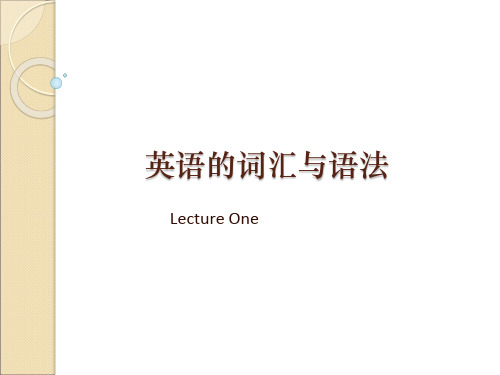
He came back last night.
Short skirts are coming back.
I told them to stand by for action.
There were several people standing by when the accident occurred.
They were able to leave Europe before the war started.
They were able to escape. /They managed to escape. /They succeeded in escaping.
We must tidy up our rooms. We have to tidy up our rooms. If I buy that car, I’ll have to
The sight of the watch reminded me of my late mother.
The sight of the watch reminded me that I was late.
Professor Tucker is the present chairman.
We all stood up when the guest professor came in.
He stood the statue up in a corner.
Many people showed up at the meeting.
Jack likes to show people up in public.
time. I remember taking the medicine at the right
词汇与语法
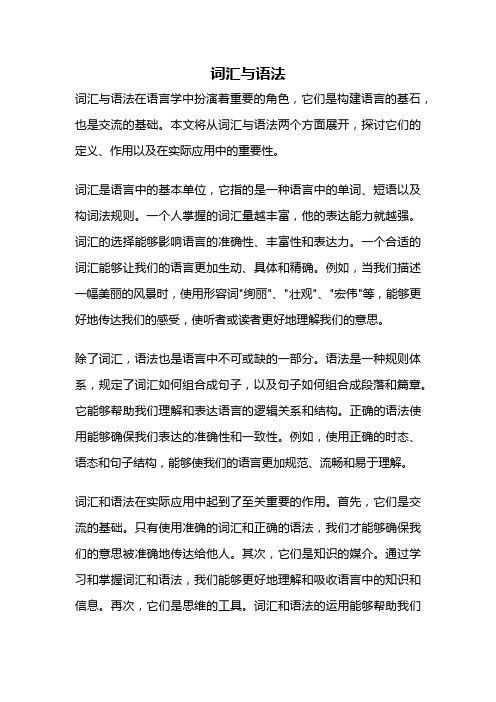
词汇与语法词汇与语法在语言学中扮演着重要的角色,它们是构建语言的基石,也是交流的基础。
本文将从词汇与语法两个方面展开,探讨它们的定义、作用以及在实际应用中的重要性。
词汇是语言中的基本单位,它指的是一种语言中的单词、短语以及构词法规则。
一个人掌握的词汇量越丰富,他的表达能力就越强。
词汇的选择能够影响语言的准确性、丰富性和表达力。
一个合适的词汇能够让我们的语言更加生动、具体和精确。
例如,当我们描述一幅美丽的风景时,使用形容词"绚丽"、"壮观"、"宏伟"等,能够更好地传达我们的感受,使听者或读者更好地理解我们的意思。
除了词汇,语法也是语言中不可或缺的一部分。
语法是一种规则体系,规定了词汇如何组合成句子,以及句子如何组合成段落和篇章。
它能够帮助我们理解和表达语言的逻辑关系和结构。
正确的语法使用能够确保我们表达的准确性和一致性。
例如,使用正确的时态、语态和句子结构,能够使我们的语言更加规范、流畅和易于理解。
词汇和语法在实际应用中起到了至关重要的作用。
首先,它们是交流的基础。
只有使用准确的词汇和正确的语法,我们才能够确保我们的意思被准确地传达给他人。
其次,它们是知识的媒介。
通过学习和掌握词汇和语法,我们能够更好地理解和吸收语言中的知识和信息。
再次,它们是思维的工具。
词汇和语法的运用能够帮助我们整理和表达思维,促进我们的逻辑思考和创造力发展。
然而,词汇和语法的学习与应用并非易事。
首先,词汇的学习需要大量的积累和运用。
我们可以通过词汇书、阅读和实践等方式来扩展词汇量。
其次,语法的学习需要掌握一定的规则和知识。
我们可以通过语法书、语法课程和语法练习来提高语法水平。
此外,词汇和语法的应用也需要不断的实践和反馈。
我们可以通过与他人交流、写作和阅读等方式来提高我们的词汇和语法运用能力。
词汇与语法是语言学中不可或缺的两个方面。
词汇是语言的基本单位,它们的选择能够影响语言的准确性和表达力;而语法是语言的规则体系,它们的正确使用能够保证语言的准确性和一致性。
成考词汇与语法2

Note2:有时,“could + have + 过去分词” 表 示过去本来有可能,但是没有做(或发生)某 事,有责备口吻。
We could have started a little earlier. Or we
would have got there.(我们本来可以早一点动身
的。要不我们就已经到那儿了。)
• • • • • • • • • •
也 _____ 总,一直 _____ 和,而且 ______ 另一个 ________ 任何 _____ 任何事物 _______ 因为_______ 问 ________ 走开,跑掉_____ …当中 _______
• • • • • • • • • •
核心词汇 能,会 ______ 接受 ______ 成就 ________ 实际的________ 钦佩,羡慕_____ 承认________ 优势_________ 买的起 _______ 同意,赞同______
look at (看) object to (反对) rely on (依靠) stand for (代表) apply for (申请) believe in (信仰) come across (偶遇) go through (通过) listen to (听) look into (调查) play with (玩) speak of (谈论) wait for (等待)
She can’t / couldn’t be more than thirty.
They can’t / couldn’t have gone out because the light’s on.
Can / Could the man still live in that old house?
语言学中的语法与词汇
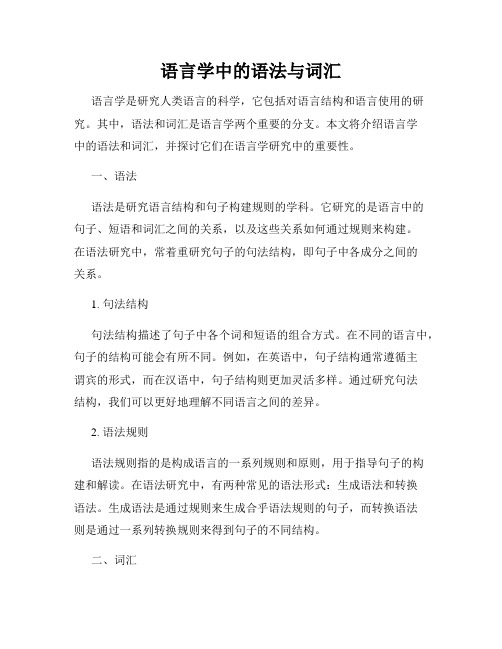
语言学中的语法与词汇语言学是研究人类语言的科学,它包括对语言结构和语言使用的研究。
其中,语法和词汇是语言学两个重要的分支。
本文将介绍语言学中的语法和词汇,并探讨它们在语言学研究中的重要性。
一、语法语法是研究语言结构和句子构建规则的学科。
它研究的是语言中的句子、短语和词汇之间的关系,以及这些关系如何通过规则来构建。
在语法研究中,常着重研究句子的句法结构,即句子中各成分之间的关系。
1. 句法结构句法结构描述了句子中各个词和短语的组合方式。
在不同的语言中,句子的结构可能会有所不同。
例如,在英语中,句子结构通常遵循主谓宾的形式,而在汉语中,句子结构则更加灵活多样。
通过研究句法结构,我们可以更好地理解不同语言之间的差异。
2. 语法规则语法规则指的是构成语言的一系列规则和原则,用于指导句子的构建和解读。
在语法研究中,有两种常见的语法形式:生成语法和转换语法。
生成语法是通过规则来生成合乎语法规则的句子,而转换语法则是通过一系列转换规则来得到句子的不同结构。
二、词汇词汇是语言学中另一个重要的研究领域,它研究的是语言中的词汇单位,包括词的形态、意义和用法。
词汇是语言中最基本的单位,而且词汇的选择和使用对于语言的表达具有重要意义。
1. 词的形态词的形态指的是词的结构形式和各种形态变化。
在不同语言中,词的形态可能会呈现出不同的特点。
例如,在英语中,词的形态变化主要体现在词的时态和语态上,而在汉语中,词的形态变化则更多涉及到音变、声调等方面。
2. 词的意义和用法词的意义和用法是指词在语言中的具体含义和用途。
不同的词拥有不同的意义和用法,在不同的语境中可能会产生不同的引申或隐含意义。
通过研究词的意义和用法,我们可以更好地理解语言中的词汇选择和表达方式。
三、语法与词汇在语言学研究中的重要性语法和词汇是语言学研究中的两个基石,它们相互交织,共同构成了语言的基本要素。
以下是它们在语言学研究中的重要性:1. 语言描述与解释语法和词汇的研究可以帮助我们对语言进行描述和解释。
英语的词汇与语法

• 复合词 • 欢迎,欢喜,月亮
• • • • • • • •
形旁和声旁的搭配: 左形右声,如:湖、糊、情、晴、铜 外形内声,如:园、圆、阁、庭、厅 右形左声,如:功、领、郊、放、歌 上声下形,如:态,愈、型、堡、贷 上形下声,如:雯,笨,葫、露、筏 内形外声,如:辫、辩
同音异形异义
禄,麓,路,陆,碌,露,鹿
• 多音节词 • 蜉蝣,玻璃,葡萄,玫瑰,蜘蛛 • • • • 前后缀: 子,头,儿,老 斧头,枕头、石头 胡子、杯子,被子、鼻子、日子 老虎,老鹰,老师
• 象形文字(pictograms):模仿具体事物的外形特征。 • 日、月、山、水
• 表意文字(Ideograms):表示抽象概念。 • 上、下、凹、凸
• 会意字:字形或字义合并,表达此字的意思。 • 明、鸣
• • • • • •
形声字(pictophonetic characters) 形旁表示字的意思或类属,声旁表示字的发音。 百分之八十以上的汉字属形声字。 糊、瑚、湖、蝴、葫、猢、煳、鹕 形旁:约250个 声旁:约1300个
Pictographic(象形文字的)
• 用字素表示世界上的各种实体。 • 例如:波浪线条表示大海或河流。
Ideographic (表意文字的)
• 表意文字是象形文字演变而来。 • 表意符号带有意义,但与现实没有很清晰的图像联系。 • 例如,“脚”的图像可表示“走”、“站”等意思。
Logographic (语标的)
英语的词汇与语法
Two
Hale Waihona Puke 文字• 人们的最早文字符号类似于文字的原始图案和符号,出现 在大约公元前3500年的中东和东南欧。 • 法国南部发现的符号
• 西班牙发现的符号
专业英语四级语法与词汇-2

专业英语四级语法与词汇-2(总分:30.00,做题时间:90分钟)一、单项选择题(总题数:30,分数:30.00)1.At first, the speaker was referring to the problem of pollution in the country, but halfway in her speech, she suddenly ______ to another subject.∙ A. committed∙ B. switched∙ C. favored∙ D. transmitted(分数:1.00)A.B. √C.D.解析:[考点] 考查动词词义辨析。
commit意为“委托”;switch意为“跳到,转到”;。
favor意为“喜欢”;transmit意为“传送”。
根据句意可知选B。
2.As a salesman, he works on a(n) ______ basis, taking 10% of everything he sells.∙ A. income∙ B. commission∙ C. salary∙ D. pension(分数:1.00)A.B. √C.D.解析:[考点] 考查名词词义辨析。
income意为“收入”,指一个人一段时间内的劳动所得;commission意为“佣金”,指同意给予提供服务的销售代表或代理人的酬金或百分比;salary意为“薪水”,是付给一个人固定的劳动补偿;pension意为“退休金”。
根据句意可知选B。
3.I'd rather you ______ those important documents with you.∙ A. don't take∙ B. didn't take∙ C. won't take∙ D. not take(分数:1.00)A.B. √C.D.解析:[考点] 考查虚拟语气。
词汇化二例_兼谈词汇化和语法化的关系

《当代语言学》第7卷2005年第3期225-236页,北京词汇化二例3———兼谈词汇化和语法化的关系王灿龙中国社会科学院语言所提要 词汇化是指一个短语或由句法决定的其他语言单位在语言的发展演变中其自身变成一个稳固词项的过程。
本文以汉语中的“恨不得”和“物色”为例,通过对它们词汇化过程的分析,试图揭示某些词汇化的机制和规律。
文章还在此基础上简单探讨了词汇化与语法化的关系问题。
本文认为,词汇化和语法化虽是两种不同的语言演变形式,但有的演变机制却为二者所共有,有的词汇化过程常常伴随着语法化,在宏观动因上它们也有很大的一致性。
词汇化和语法化的研究应该纳入整个语言变化的框架内来进行,既要看到它们各自的特点,也要看到它们之间的联系,任何将它们割裂开来甚至对立起来的作法都不利于全面、准确地认识和把握语言的演变规律。
关键词 词汇化个案分析语法化1.引言自二十世纪初Meillet 提出“语法化”(gra mmaticalizati on )并初步分析这种语言变化的现象以来①,语法化理论得到了很大的发展和丰富,世界范围内的语言研究特别是历时语言研究非常重视该理论,语言学家们利用语法化理论分析研究语言现象取得了丰硕的成果。
随着研究的深入和发展,人们开始注意到语言演变过程中的另一种现象,即一个短语或由句法决定的其他语言单位在经历了一段时间之后,其自身变成一个稳固的词项(lexical ite m ),并且进入基本词汇或一般词汇,人们称这一过程或现象为词汇化(lexicalizati on )。
简而言之,词汇化就是一种句法单位成词的凝固化。
同语法化一样,词汇化也不仅仅局限于个别语言,可以说它是人类语言演变的一个较为普遍的现象,它在各种语言中都有不同程度的反映。
本文拟从汉语中选取两个个案进行分析,并在此基础上简单探讨一下词汇化与语法化的关系问题。
本文考察的两个个案都是《现代汉语词典》(2002年增补本,中国社会科学院语言研究所词典编辑室编纂,1996年修订本)收录的词项。
- 1、下载文档前请自行甄别文档内容的完整性,平台不提供额外的编辑、内容补充、找答案等附加服务。
- 2、"仅部分预览"的文档,不可在线预览部分如存在完整性等问题,可反馈申请退款(可完整预览的文档不适用该条件!)。
- 3、如文档侵犯您的权益,请联系客服反馈,我们会尽快为您处理(人工客服工作时间:9:00-18:30)。
答案是:A
【句意】警卫人员把在法庭上大声喊叫的两个男人赶了出去。
【难点】expel意为“赶走”;propell意为“推进,推动(=push forward);repell意为“击退,排斥,拒绝”;dispel 意为“驱散(云雾等)”。
My passport ____last month, so I will have to get a new one.
C. justify D. prove
答案及解析:
答案:B
【句意】每天都有新闻报导、政府报告和科研结果证实人口变化带来越来越多的后果。【难点】testify意为“证明”,可作不及物动词,后接to;verify意为“证明,查对”,指通过调查或与可查清的事实的比较来证明某事是对的;prove意为“证明,证实”,指用足够的证据来证明某事是否正确;justify意为“证明…是正当的,为…辩护”。
Every day, the news, government reports and scientific studies ______ to the increasing consequences of population change.
A. verify B. testify
The unpleasant taste ____ in his mouth for hours.
A. prolonged B. waited
C. lingered D. lengthened
答案:C
【句意】那种难受的味道在他口中持续了好几个小时。
The security guard ____ two men who were yelling in the courtroom.
A. expelled B. propelled
C. repelled D. dispelled
There were a number of tall structures ____ in different colors. A. enlightened B. brightened
C. burning D. illuminated
A. dwells B. settles
C. resides D. inhabits
答案及解析:
答案:C
【句意】美国总统在任职期间居住在白宫内。
【难点】reside意为“居住”,不及物动词;dwell意为“住,寓于”,文学用语;settle意为“安顿”;inhabit意为“居住”,及物动词。
He was ____with the power of acute observation.
A. conferred B. endowed
C. equipped D.bestowed
答案是:B
【句意】他具有敏锐的观察力。【难点】endow意为“赋予”,后接with;confer…on意为“授予,给予…”;equip…with意为“装备,配备…”;bestow…on意为“授予,赠予”。
A. affiliating B. conflicting
C. afflicted D. inflicting
答案:D
【句意】蒙哥马利信奉召集一支无可抵御的军队,然后给其对手以毁灭性的打击。
【难点】affiliate意为“使隶属于”;conflict 意为“冲突”;inflict和afflict容易混淆,前者指将不受欢迎的事强加于(人),而后者指引起身体或精神上的痛苦。
A. elapse B. expired
C. ended D. terminated
答案是:B
【句意】我的护照上个月期满,我得换个新的。【难点】elapse意为“时间消逝”;expire意为“(期限等)终止;开始无效”;terminate意为“终止”,相当于end,但比end正式,为及物动词。
Please ____ me on that subject.
A. enlighten B. acquaint
C. inform D. instruct
答案是:A
【句意】请帮我弄明白那个问题。
【难点】enlighten与instruct同义,意为“指导,教导”,但搭配不同。enlightensb. on sth.教导某人某事,使某人明白某事;instruct sb. in sth.教,教导某人某事;acquaint用于短语aquaint sb. with“使某人知道,使某人熟悉”;inform 用于短语inform sb. of sth.意为“告知某人某事”。
答案是:C
【句意】他们两人都看不起他,并在工作中妨碍他。
【难点】block意为“阻挡,堵塞”,常用来指具体的,有形的事物;prevent意为“阻挡,阻止”;hamper意为“妨碍,阻碍,牵制”,搭配词组有:hamper sb. from(doing)/in sth.意为“妨碍某人(干)某事”;stop意为“阻止”,与from连用。
答案是:D
【句意】有许多高层建筑被五颜六色的灯光所照耀。
【难点】illuminate意为“照亮”;enlighten意为“启发,开导”;brighten意为“使更为光明,使更愉快”;burning意为“燃烧的”。
Montgomery believed in assembling an overwhelming force and then______ a crushing blow on his opponent.
Neither of them thought highly of him and they both tried to______him in his work.
A. block B. prevent
C. hamper D. stop
【难点】linger意为“徘徊”;prolong意为“延长,拉长”,主要指某事持续一个长时间而超出正常应有的范围,也可指空间方面变得更长;lengthen意为“拉长”,指空间或时间方面变得更长;wait意为“等候”。
The US president ____in the White House during his turn in office.
